| October 27, 2020 -
No. 73 Militant
Action by Alberta Health Care Workers Hospital
Workers Walk Out Across
Alberta to Defend Their Rights and
Public
Health Care
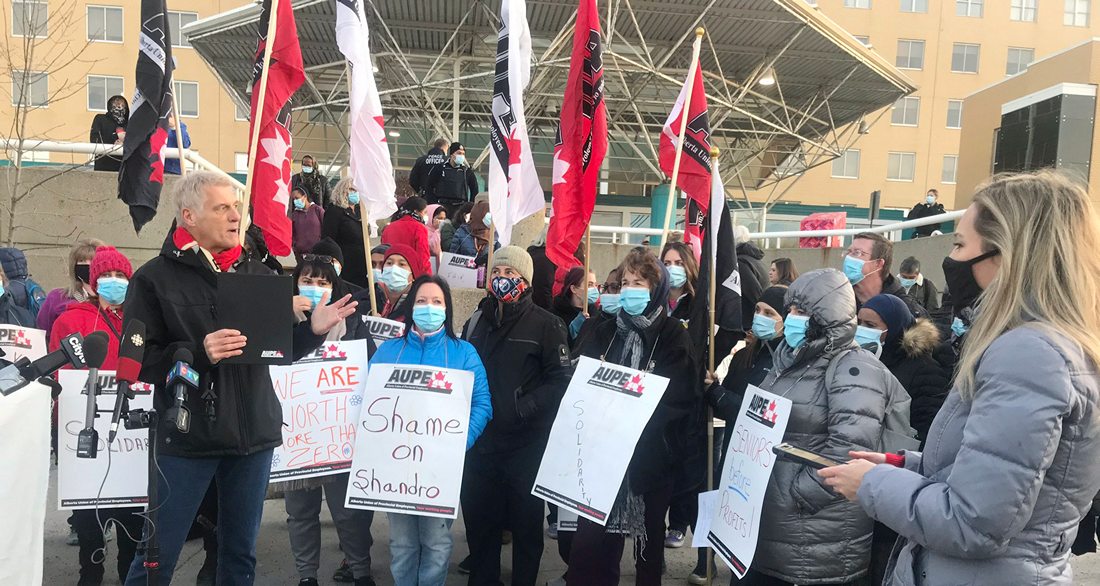
•
Statement in Solidarity with
Striking Health Care Workers - Friends of Medicare
One
Year of Government Refusal to Negotiate with Public Sector Workers
• The Quebec Government's
Irresponsible and Dangerous
Position -
Pierre
Chénier
• No New Collective
Agreement and No Progress in Negotiations
Workers
Demand Job Security in the Midst of Pandemic
• Actions Across Canada
by Hospitality Workers - Brian Sproule
Militant
Action by Alberta Health Care Workers 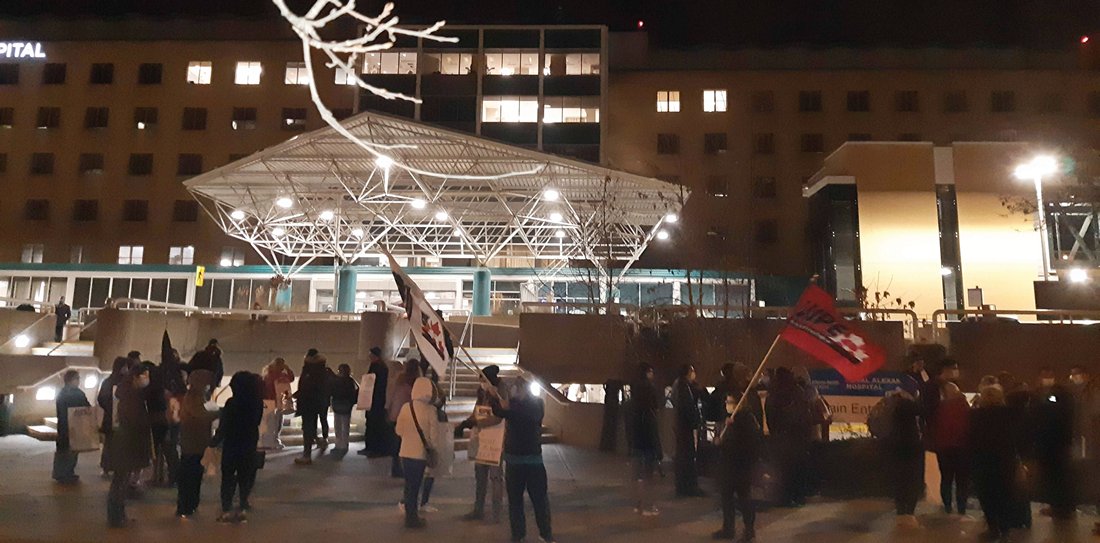
Walkouts
began in the early morning at Royal
Alexandra Hospital in Edmonton.
Hospital
workers, members of the Alberta Union of Provincial Employees (AUPE),
walked off the job in 31 hospitals and health centres in 23 cities and
towns across Alberta on October 26. Walkouts took place in Athabasca,
Calgary (Foothills, Peter Lougheed, Rockyview, South Health Campus, and
Sheldon Chumir), Canmore, Cardston, Claresholm (General Hospital and
Centre for Mental Health and Addictions). Cold Lake, Edmonton (Alberta
Hospital, Royal Alexandra, University of Alberta, and Glenrose
Hospitals and Edmonton Remand Centre), Evansburg, Ft. Saskatchewan,
Grande Prairie. High Level, High Prairie, Leduc, Lethbridge, Okotoks,
Ponoka, Red Deer, Sherwood Park, Slave Lake, Stony Plain, Westlock,
Wetaskiwin, and Whitecourt. A press release issued
by AUPE on October 26 quotes union president Guy Smith: "Anger
has been building among members
for months. [...] The recent
announcement by Health Minister Tyler Shandro of 11,000 jobs being cut
in the middle of a global deadly pandemic was the last straw for
them. [...] 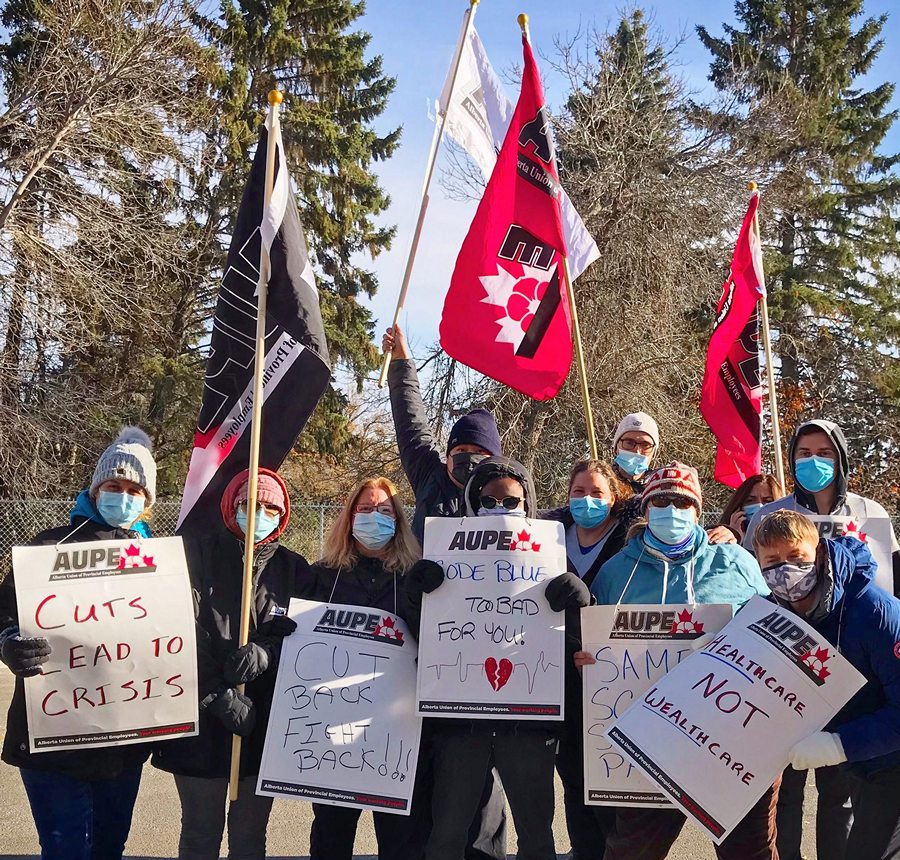 "Nursing-care
and support workers decided today that
there was no other option but to fight to protect Albertans at risk,
especially during the deadliest pandemic in a century. By constantly
short-staffing public health care, this government is pushing our
members to the breaking point exactly when Albertans need them most. "Nursing-care
and support workers decided today that
there was no other option but to fight to protect Albertans at risk,
especially during the deadliest pandemic in a century. By constantly
short-staffing public health care, this government is pushing our
members to the breaking point exactly when Albertans need them most.
"Across this province, working people are rising up
against Jason Kenney's job-killing policies and are joining the fight
in solidarity. This was a decision taken by the members themselves.
AUPE is a democratic union and we respect the wishes of our members."
The press release states that "AUPE Members are
committed to ensuring
patients' safety during any dispute," and quotes Smith saying:
"Members will do everything in their power to keep
Albertans safe. Public safety is why they are taking this action. They
know that slashing thousands of frontline jobs during a pandemic is
mad. It will lead to lower levels of care and higher costs. It will
lead to tragedies. [...] "[Alberta
Health Minister] Shandro and [Alberta Premier] Kenney have arrogantly
dismissed the vital role our members play in frontline health care.
After risking their lives to come to work every day for more than seven
months -- to treat patients, to prevent infections, to keep hospitals
running -- their reward is to see their jobs axed and handed over to
corporations seeking to profit off patient care. That is shameful."
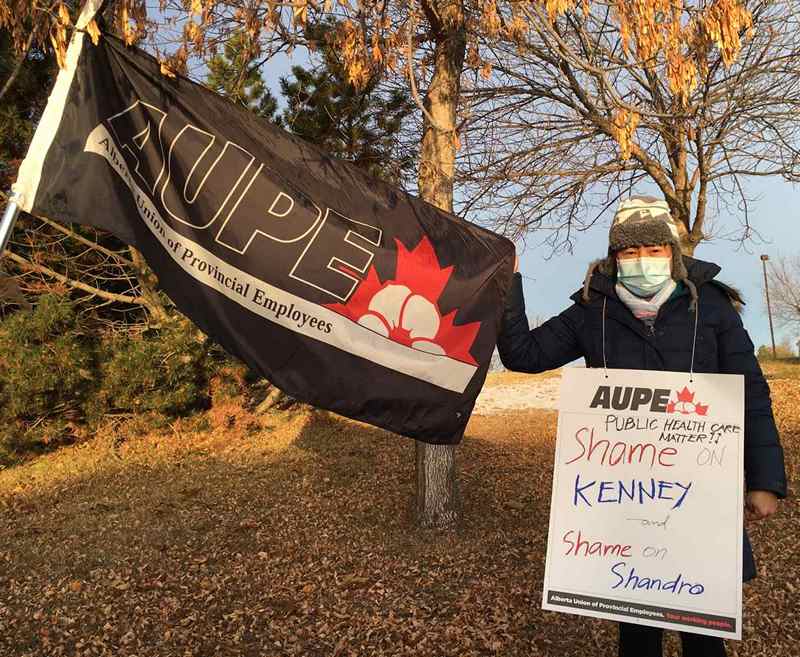
Athabasca
Hospital |
Smith
appealed
for other Albertans to join the fight.
"All Albertans are being targeted by this government. If you are a
public or private-sector worker, a parent, a student, a teacher,
someone with a handicap or disabilities, you are all under attack. This
is your fight, too." Alberta
Health Services immediately called on the Alberta Labour Relations
Board to issue a cease and desist order requiring the workers to return
to work, calling the strike "illegal." The labour board issued a cease
and desist order at 9 pm on October 26. Following the decision, AUPE
issued the following statement:
"After drawing
national
attention to the privatization of health care in Alberta, health care
staff represented by the Alberta Union of Provincial Employees (AUPE)
are returning to work Tuesday, October 27, following an order by the
Alberta Labour Relations Board (ALRB) to cease and desist their wildcat
strike.
"AUPE members won support from across
Alberta for their
heroic stand, and proved once and for all that healthcare staff is more
than doctors and nurses. AUPE is notifying all its members of the
obligation to obey the ALRB order by returning to scheduled work."
Throughout
the day on October 26, the message was clear that the walk-out
signalled the beginning of a fight that must be won. Health care
workers put themselves on the line every day to care for the people.
They are fighting for the conditions needed to provide care and
services, while the government is intent on its gigantic pay-the-rich
schemes, privatizing and handing over public services to the uber-rich
global corporate interests. The battle for public opinion is on! How
dare the Kenney government downgrade services and the conditions of
health care workers in the midst of a pandemic, people responded,
expressing their support for the workers. Frontline workers know that
it is disastrous to hand over medical labs and the control of keeping
hospitals clean, providing laundry and linens, feeding patients, and
more to private interests whose only goal is to make maximum profits.
How dare you treat our heroes like zeroes, they said.
The
workers take responsibility every day, while governments who serve the
rich refuse to take any responsibility for the consequences of their
anti-social, anti-worker decisions. Instead they use the power of the
state to declare the workers’ actions "illegal." This is not
justice. This shows they are unfit to rule and cannot be trusted with
the decision-making power. Workers'
Forum calls on all Albertans and people across the country
to speak out and support the hospital workers!
Withdraw All Layoffs Now!
Increase
Funding for Health Care and Social
Programs!
No to Privatization!
Stop Paying the Rich! Edmonton
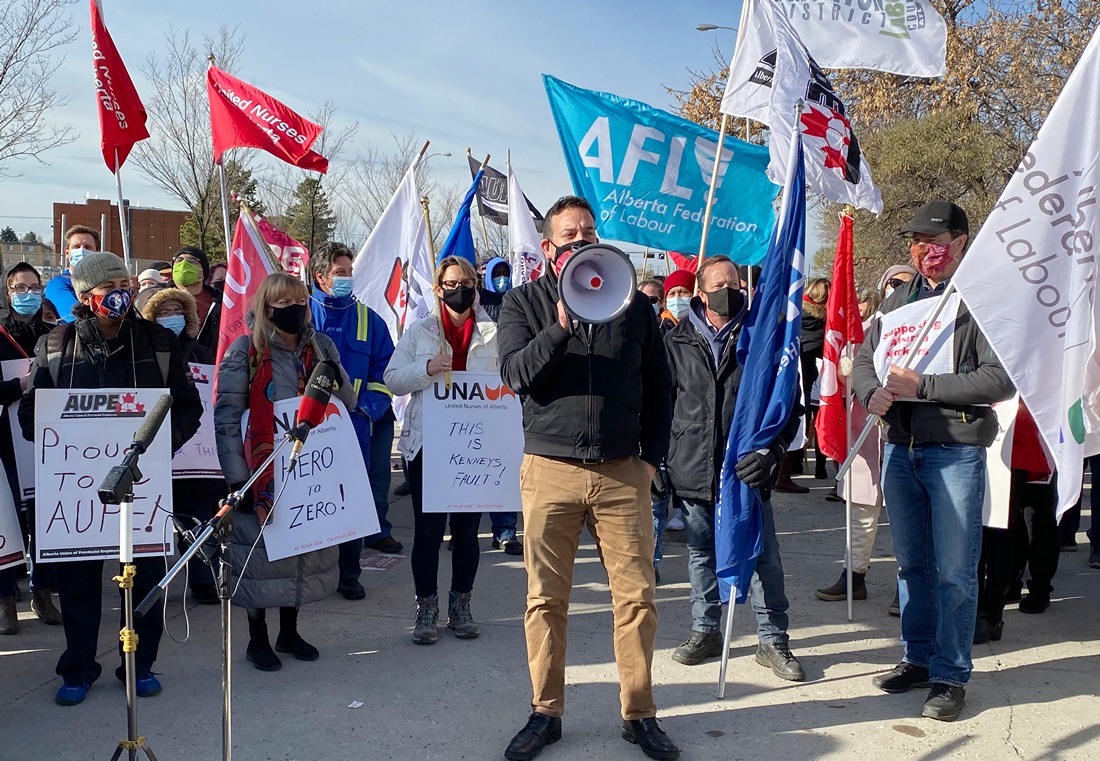 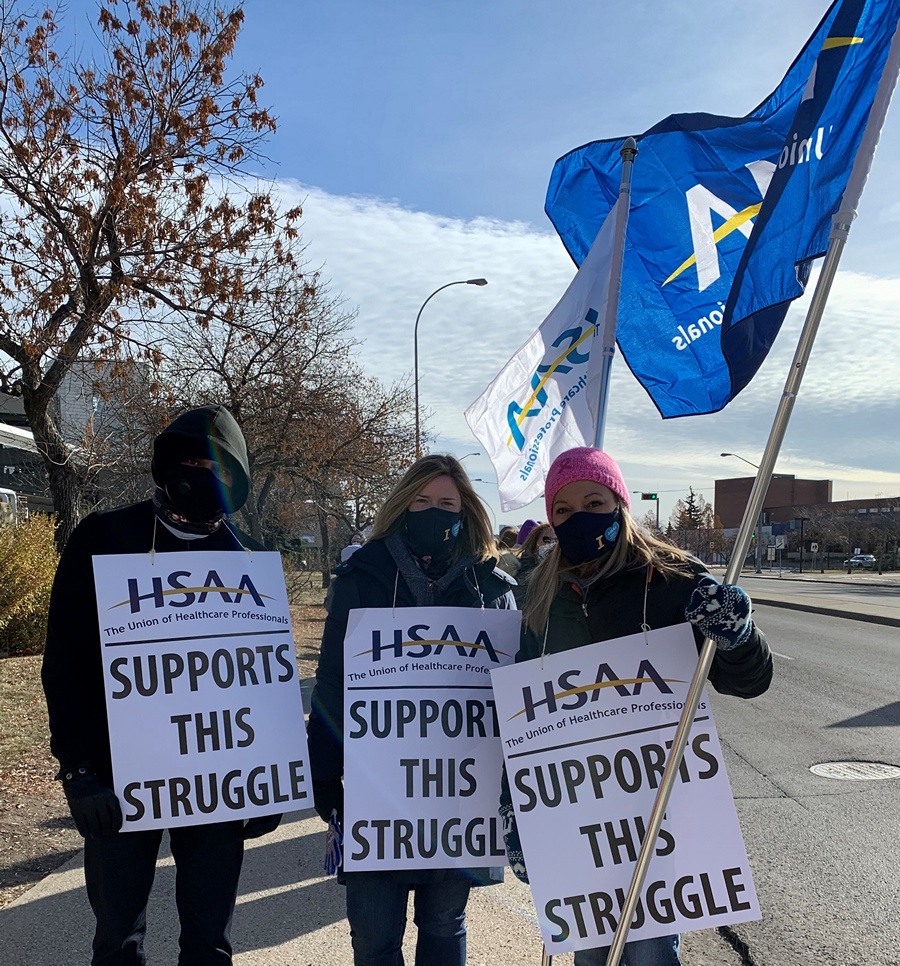
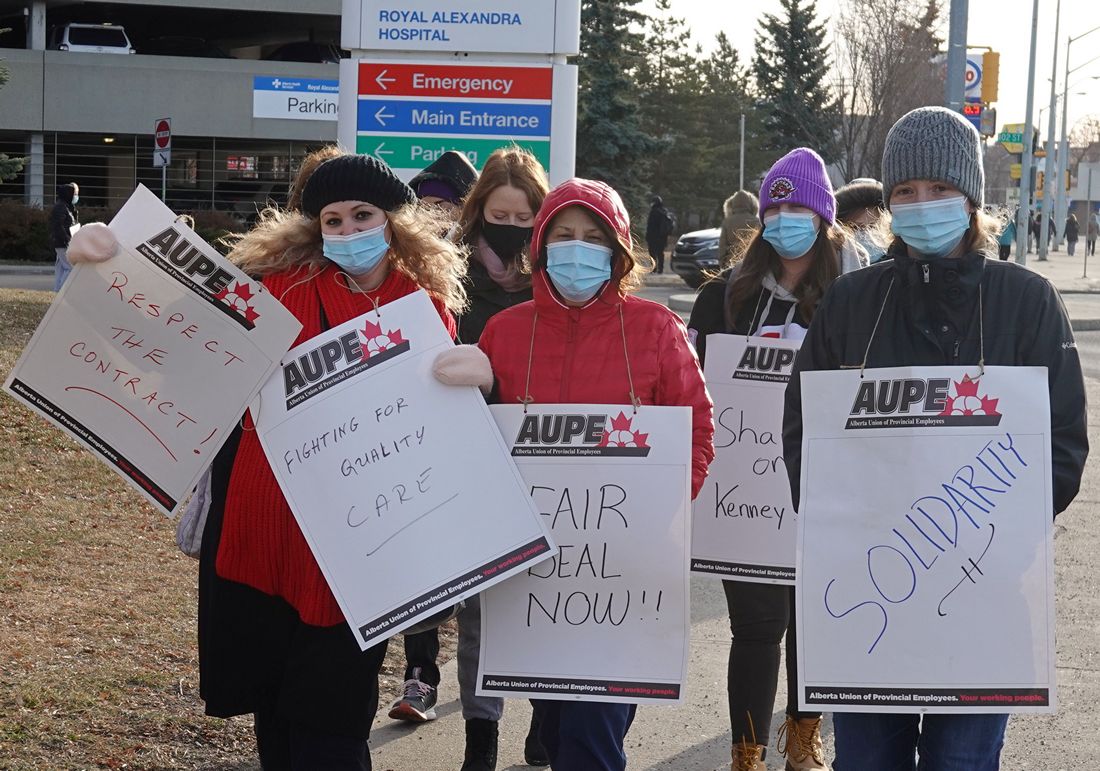 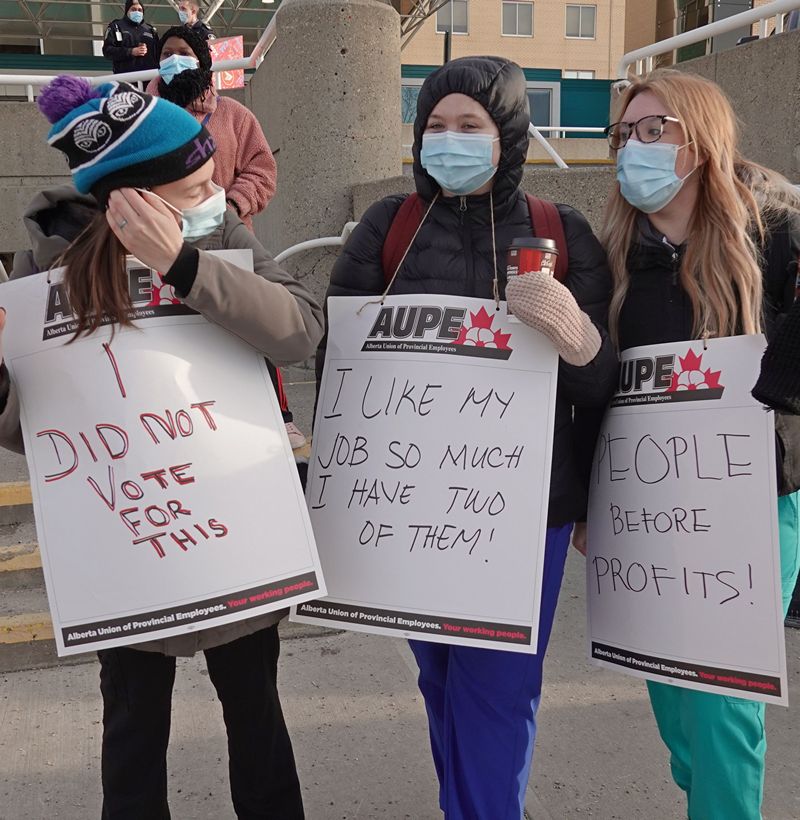
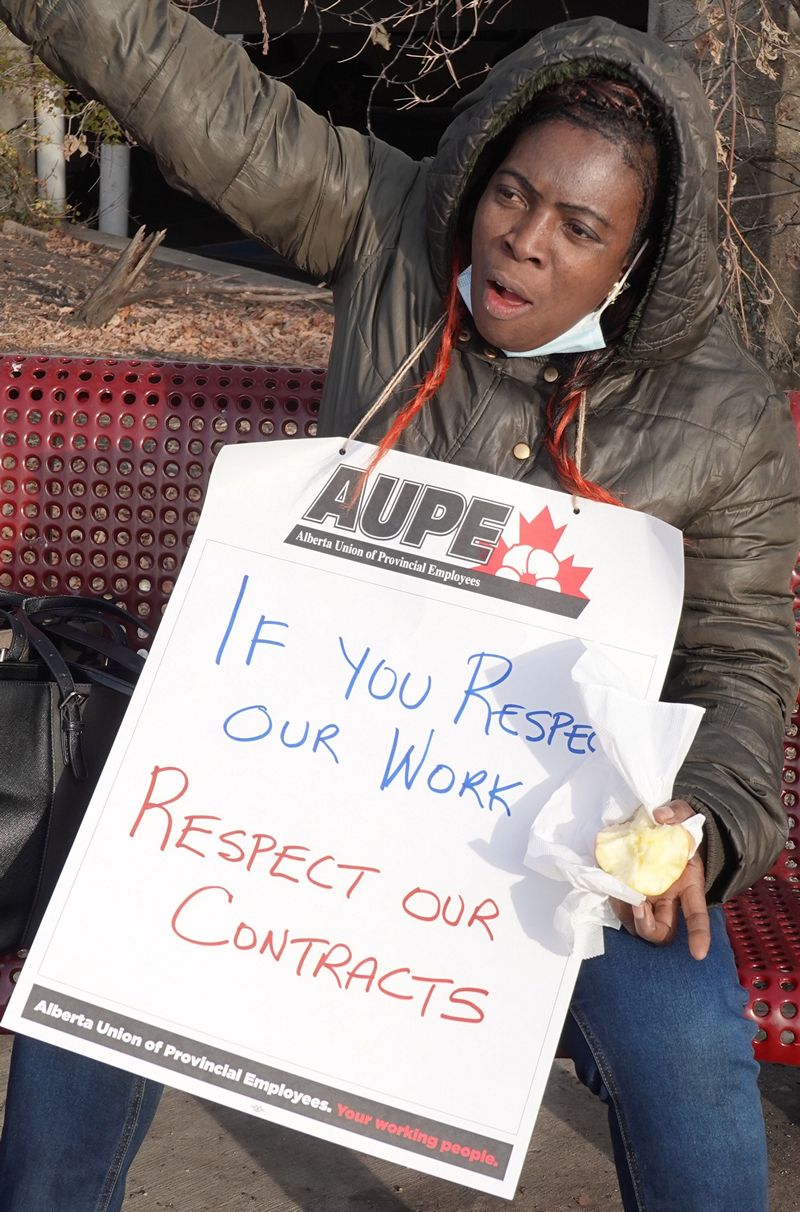  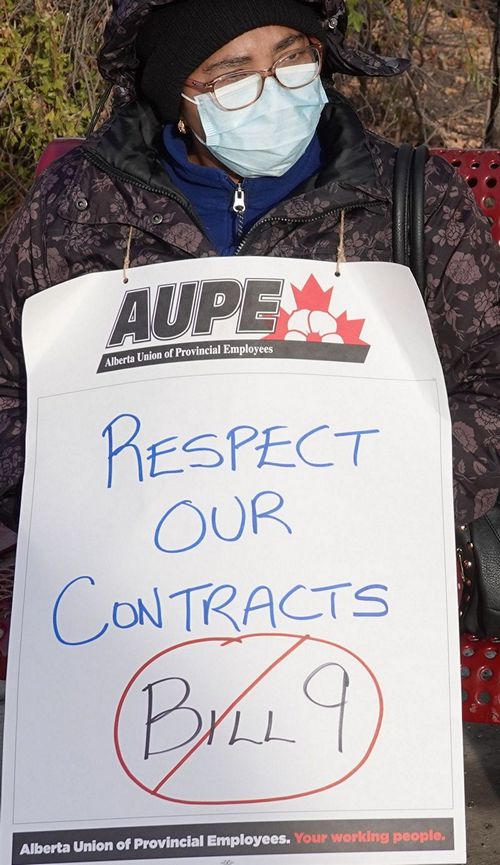

Calgary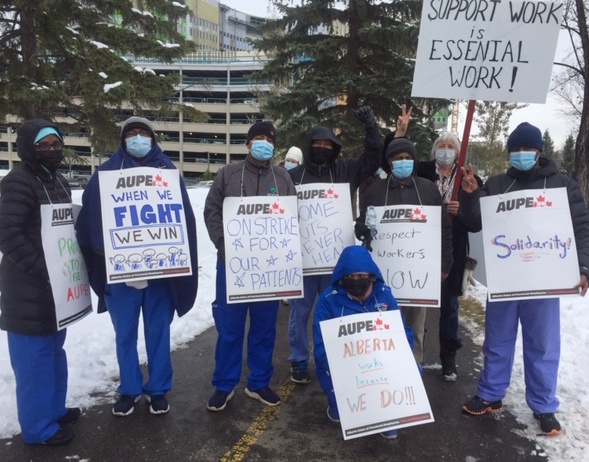 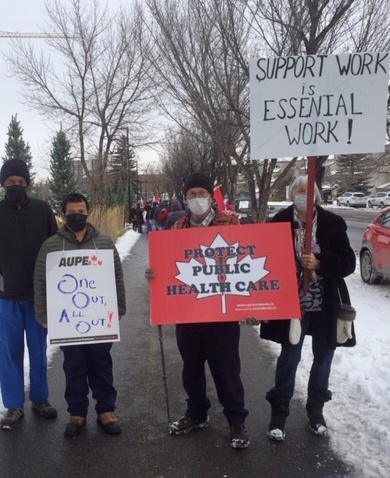
 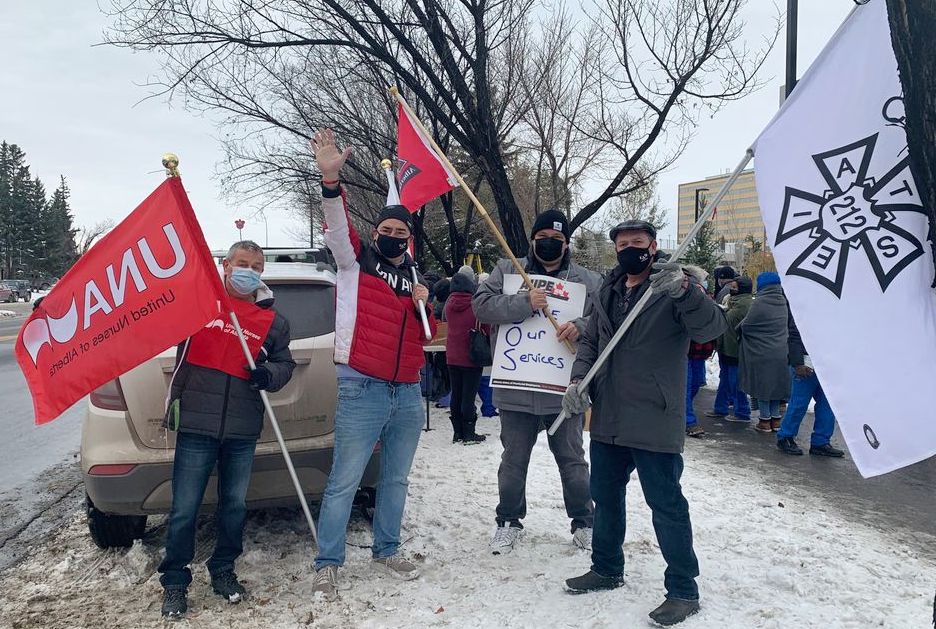
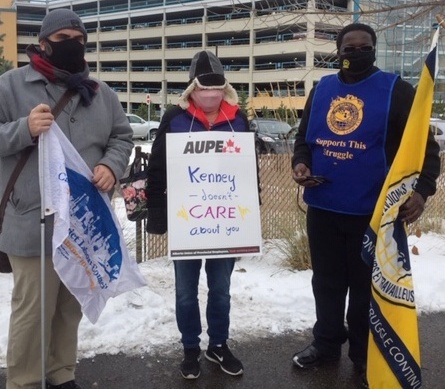 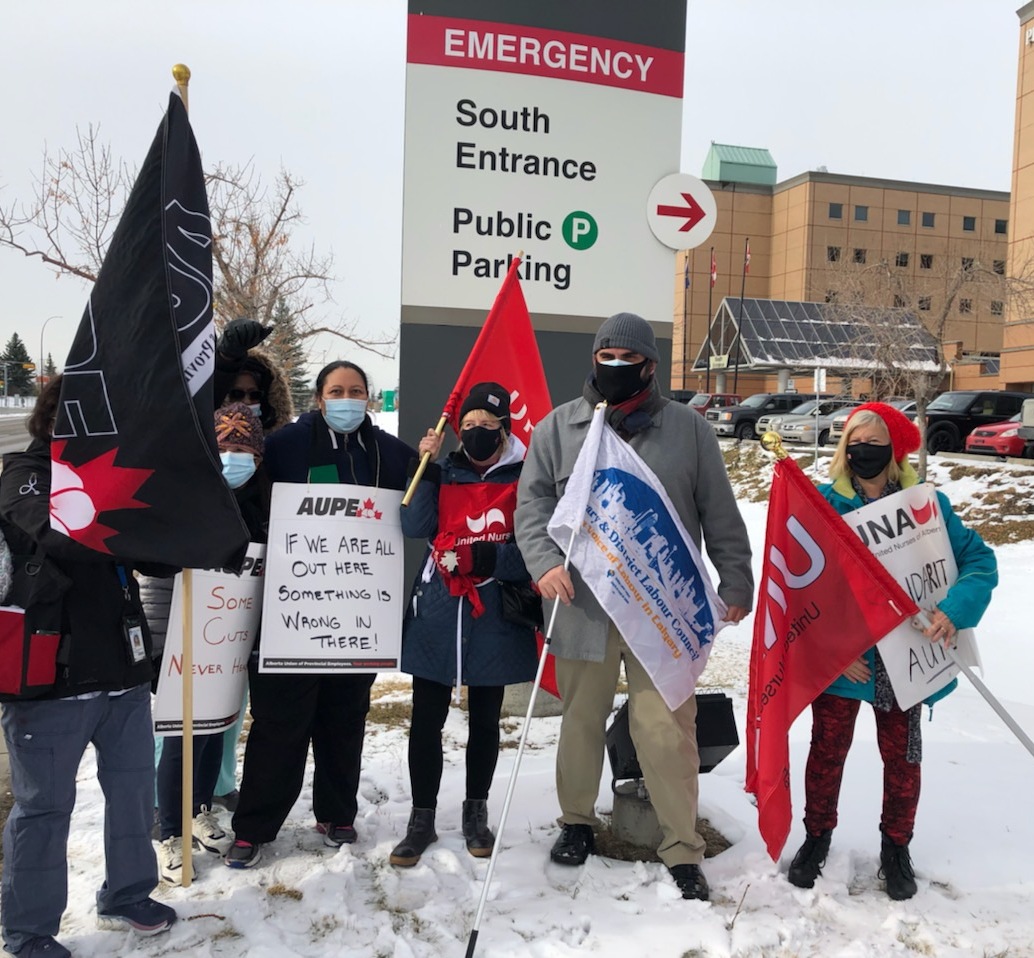
Red
Deer
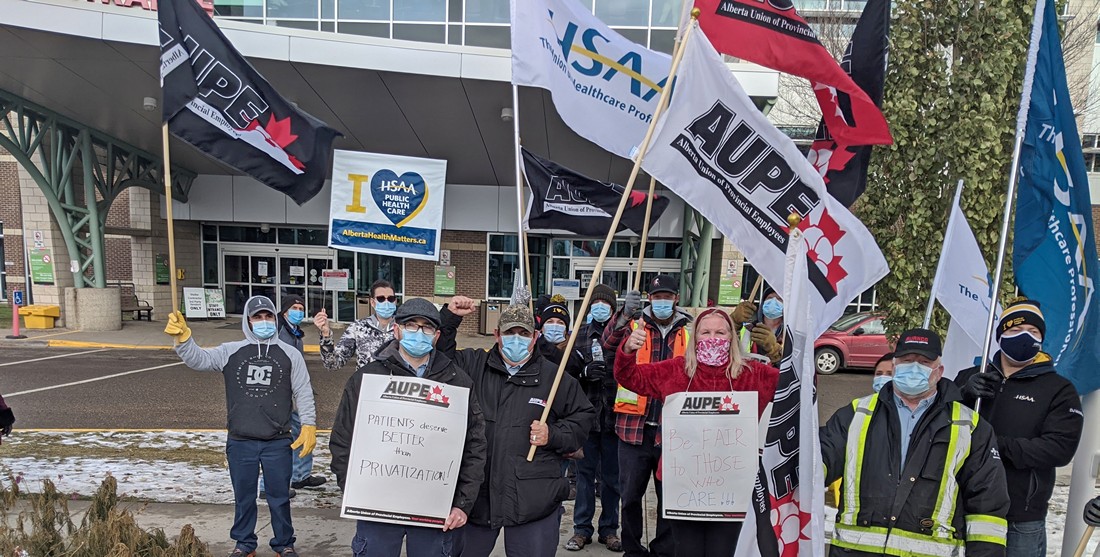

-
Friends of Medicare - 
Frontline hospital workers represented by the Alberta
Union of Public Employees have walked off the job at locations across
Alberta today, to defend their jobs and the public health care system
that keeps Albertans safe and healthy. This is a
decision that no health care worker takes
lightly. These workers know better than anyone the importance of a
strong and well-resourced public health care system, and they know what
is at stake of being lost if the government continues to pursue their
incessant cuts. Health care workers are striking today because they
need to be sure
that they are equipped to provide the best possible care for patients,
and they know this government stands in the way of that. 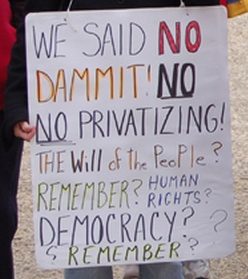 Since
they formed government, the UCP has made it implicitly clear that they
are not interested in supporting our vital public health care system.
Jason Kenney has pursued an aggressive agenda of cutting and
privatizing the public services on which Albertans all rely. Even in
the face of a global pandemic, while health care workers have
proven themselves as the first line of defence in the province's
pandemic response, this government merely paused its layoffs of an
estimated 16,000 health care workers province-wide. The plan to
contract out and privatize their jobs is an insult to workers, and a
betrayal of the patients who depend on them. Since
they formed government, the UCP has made it implicitly clear that they
are not interested in supporting our vital public health care system.
Jason Kenney has pursued an aggressive agenda of cutting and
privatizing the public services on which Albertans all rely. Even in
the face of a global pandemic, while health care workers have
proven themselves as the first line of defence in the province's
pandemic response, this government merely paused its layoffs of an
estimated 16,000 health care workers province-wide. The plan to
contract out and privatize their jobs is an insult to workers, and a
betrayal of the patients who depend on them.
"Kenney's
UCP government continues to demonstrate
nothing but disdain for the workers on health care's front lines. This
government has shown that they will stop at nothing to push forward
their privatization agenda," says Sandra Azocar, Executive Director of
Friends of Medicare. "Make no mistake, everything they have done so far
is by
design. Their panels, their reviews, their legislative changes, have
all served to provide the political fodder and legal framework to
decimate those services that we value as society's great equalizers:
education and health care." We have a government
that has failed to learn from this
pandemic and does not respond to rallies, letter writing and telephone
campaigns. They don't care about petitions, and they are counting on
the fact that we can't take to the street to protest their destructive
legislation during a pandemic. In their refusal to listen to Albertans'
concerns on
behalf of our public health care system, this government has left
health care workers little choice but to strike. "This
government declared war on the frontline health
care workers of this province when they announced they were cutting
over 11,000 good health care jobs at a time when Albertans are already
struggling," says Azocar. "Jason Kenney wasn't in Alberta in 2012 when
the same workers whose jobs he is bent on attacking went on a wildcat
strike and shut down hospitals. Kenney has not seen the fight that
Albertans have waged time and again to protect our public health care.
In this wildcat strike, solidarity and people-power have never rang so
true and necessary against this government's absolutism." Friends
of Medicare stands in solidarity with striking
health care workers for the sake of patients all across this province
and for the protection of our vital public health care system.

One Year
of Government Refusal to Negotiate with Public Sector Workers
-
Pierre Chénier -  
The Quebec government is taking a dangerous and
irresponsible stand with regard to Quebec public sector workers'
attempts to negotiate new collective agreements. Although their
collective agreements expired on March 31, 2020, after more than a year
at the negotiation table with the government and their employers,
nothing has moved. On
the one hand, the Quebec government has shown no intention of
withdrawing its March 21 ministerial order which gives the executive
the power to cancel all negotiated collective agreements for workers in
the health and social services sector, so that it can change working
conditions at will. The Legault government has been very quiet about
this aspect of the ministerial orders. Clearly this acts as a sword of
Damocles hanging over the heads of workers, as any collective agreement
they negotiate can be rendered null and void. The Legault government
must immediately withdraw this ministerial order. 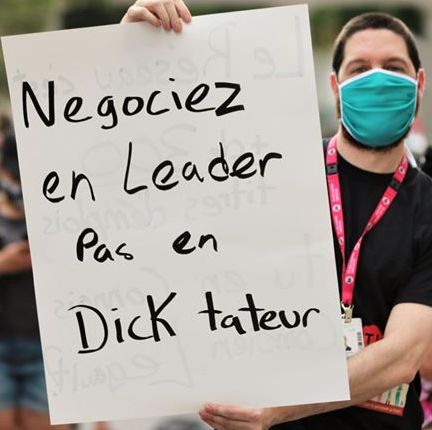 Meanwhile,
for over a year now, the same government has refused to negotiate with
public sector workers on the basis of their demands. On this it has
been very manipulative. Government claims it wants new collective
agreements to be signed as soon as possible so that full attention can
be paid to the pandemic and hopes that an agreement is possible with
the unions. At the same time, at the bargaining tables, it invokes the
same worn out neo-liberal arguments put forward by governments for over
30 years, that its fiscal framework is tight and is even making demands
for concessions. Meanwhile,
for over a year now, the same government has refused to negotiate with
public sector workers on the basis of their demands. On this it has
been very manipulative. Government claims it wants new collective
agreements to be signed as soon as possible so that full attention can
be paid to the pandemic and hopes that an agreement is possible with
the unions. At the same time, at the bargaining tables, it invokes the
same worn out neo-liberal arguments put forward by governments for over
30 years, that its fiscal framework is tight and is even making demands
for concessions.
In doing so, not only is it negating the rights and just
demands of workers, it is also placing their safety and that of the
communities at risk, as these demands are the necessary ingredient to
overcome the second wave of the pandemic, the government's professed
aim! Workers can see that the anti-social offensive that has
wrecked the society
for over thirty years is being pursued within the conditions of this
crisis, with this crisis being used as the pretext. The
argument of a tight fiscal framework does not hold.
It is based on the false claim that the pandemic must unavoidably lead
to an economic collapse, the burden of which is to be shifted onto the
people. This framework has been decided by the cartel parties on the
basis of the demand that the rich must be paid under all circumstances.
People
have no say in what is referred to as the "framework." This
is the time to think and act in favour of the
people and the society in this difficult situation. The demands of the
public sector must be met, both as a matter of rights and of urgency.
Public discussion must take place to examine how to get the
necessary public revenue to finance public services, including
providing public
sector workers with the wages and working conditions they require to
provide the services. The demand to Stop Paying the Rich; Increase
Investments in Social Programs! provides a guideline for
action within
these circumstances. Preconceived notions that there is no
alternative to the neo-liberal wrecking of society and that we must
abandon
our demands must be rejected. All out to demand
that real negotiations be held with public sector workers on the basis
of their demands! 
 
Collective agreements of approximately 550,000 public
sector workers in Quebec expired on March 31, 2020. Negotiations began
about a year ago but no new collective agreement has yet been
signed, and according to the unions, no agreement is in sight in the
near future unless the government begins to negotiate seriously to meet
the workers' pressing demands. Some Basic Facts
The workers involved in the negotiations include 58,500
in the public service, 260,000 in health and social services, 32,000
teachers and education workers in colleges, and 195,000 teachers and
education workers in elementary and high schools
Negotiations are conducted on a sectoral and
intersectoral basis. Sectoral negotiations cover working conditions and
work organization, union activities including union leave, work tasks,
scheduling, job postings, health and safety, the status of positions as
part-time, full-time, casual, etc. -- issues specific to that sector.
Intersectoral negotiations deal
with wages, pensions, group insurance plans, parental rights and
regional disparities and cover all the workers in all the sectors.
Intersectoral negotiations are conducted directly with
the Treasury Board Secretariat. Sectoral bargaining for the public
service is also with the Treasury Board Secretariat. Sectoral
negotiations for other sectors are held with employer committees
consisting of representatives of employer associations and ministerial
representatives. These
committees all receive their direction from the Treasury Board
Secretariat. For this round of negotiations, there
is no common front
of the unions. Each union conducts its own negotiations. However, the
Alliance of the Professional and Technical Health and Social Services
Staff (APTS) and the Interprofessional Health Care Federation of Quebec
(FIQ) have formed an alliance for intersectoral bargaining. The unions
have entered into a non-raiding agreement under which they commit,
during the negotiation period, not to encourage members of one union to
join another. Wages  The
government has, for one year now, maintained its wage offer of five per
cent over three years, plus additional fixed dollar increases for
certain
categories of work. This represents no more than a cost of living
increase and is in fact a wage freeze. All the unions have rejected the
government's wage offer and consider it an insult. Workers are
demanding
wage increases that make up for lost wages after decades of anti-social
austerity and to improve their living conditions, retain staff, and
attract employees. The
government has, for one year now, maintained its wage offer of five per
cent over three years, plus additional fixed dollar increases for
certain
categories of work. This represents no more than a cost of living
increase and is in fact a wage freeze. All the unions have rejected the
government's wage offer and consider it an insult. Workers are
demanding
wage increases that make up for lost wages after decades of anti-social
austerity and to improve their living conditions, retain staff, and
attract employees.
According to a 2019 study by the Quebec
Statistical
Institute, workers in the public service, education, and health and
social services are lagging about 20 per cent behind other public
sector employees such as Hydro-Quebec workers, and about
18 per cent behind unionized workers in the private sector. In
these negotiations, the unions are taking different approaches to wage
increases. The APTS-FIQ alliance is demanding a
12.4 per cent
increase over three years, which includes 7.4 per cent in wage
catch-up. The Confederation of National Trade Unions (CSN) has fixed
amount wage demands: $2 per hour in the first year, $0.75 in the
second year, $0.75 in the third year. In this way, it wants a catch-up
for low wage
earners. For someone earning $20 an hour, $3.50 over three years is
equivalent to a 17 per cent wage increase. In order
to
counter the misinformation spread by the
government about "highly paid" public sector workers, the Quebec
Federation of Labour (FTQ) has published statistics on the average
annual salary of
its 52,000 members in the public sector: average annual salary of
public sector
employees: $36,155.49; average annual salary of casual and temporary
public
sector
employees (other than regular): $28,490.15; percentage of women in the
sector: 73.7. Working conditions There
are several demands concerning working conditions
which cannot be dealt with in detail here. The general orientation is
this:
An Acceptable
Workload The workload is unsustainable, caused by
more than 30
years of budget cuts that have resulted in mass departures, absences
due to injury and illness, schedule changes, etc. Specific needs vary
from sector to sector: acceptable caregiver/patient ratios in
health care, for example; increased staffing; stable shifts with
well-defined tasks,
etc. Elimination
of Mandatory Overtime The
transformation of part-time positions into full-time positions and
respect for full-time positions. One is impossible
without the other. When full-time
positions, as is the case now, actually mean far more than full-time
hours due to mandatory overtime, and when full-time workers are denied
statutory and other negotiated leaves people do not apply for these
full-time jobs. Stable
work teams and an end to forcing workers to move from one health
establishment to another This is particularly
important in health care where
working at more than one facility during a pandemic is unsafe for
workers and patients and also affects the quality of care. Improving Health and Safety
The health sector has become the leading sector in
Quebec in terms of work-related accidents and illnesses contracted at
work. However, the health sector is not even considered a priority
sector by the Act respecting occupational health and safety which
means that the mechanisms provided by law for priority sectors, such as
joint health
and safety committees and prevention representatives, do not even exist
in the sector. Workers are demanding prevention measures over which
they have a decisive say. Among teachers, the
demands focus on reducing class
sizes so as to create conditions conducive to quality teaching and
learning. In the conditions of COVID-19, this demand has taken on a
particularly urgent character to ensure the safety of staff, students
and communities. Teachers also demand services for students based on
their needs, a
workload that is humane and sustainable, recognition of their
profession (especially through acceptable wages), and a reduction in
precarious work (for example part-time and casual work). Rejection
of Workers' Demands and Concessionary Demands
from Government and Employers While their demands
are just, favourable to their
members, to the services and to society, public sector workers are
facing
a blunt refusal from government and employer associations.
Workers report that after a year, government and
employer negotiators still show up at the bargaining tables saying they
do not have the mandate to address any of the workers' demands. They
cite the government's tight fiscal framework as a reason for refusing
to address union demands or for rejecting them outright. On working
conditions
they say that these can only be dealt with in joint committees once
the collective agreements are signed. Workers also
report that government and employer
representatives are coming to the tables with demands for concessions.
For example, while the government is publicly proclaiming that it wants
to put an end to staff movement between establishments within the
Integrated Health and Social Services Centres, a demand for increased
mobility is
being put forward at the tables. Government and
employers are also pushing the averaging
of hours of work over an extended period in order to avoid paying
overtime
rates. Instead of paying overtime if a worker works more than the
normal defined work week, they want to average hours over a longer
period with the result that workers could be forced to work twelve or
sixteen
hours in a day at regular rates. This theft would then be called a
"reduction in overtime." To date no progress has
been made and there is no new
collective agreement in sight. Time is running out and the situation is
urgent. 
Workers
Demand Job Security in the Midst of Pandemic -
Brian Sproule -  UNITE HERE Local 75
picket in Toronto, September
22, 2020 UNITE HERE Local 75
picket in Toronto, September
22, 2020
.
Hospitality workers in Vancouver, Toronto and Ottawa
organized actions on October 22 in support of their demands for
protection of their jobs. A joint press release of UNITE HERE Local 40
in BC and Local 75, representing workers in Toronto, issued
on the day of the actions, states: "UNITE HERE! Canada is urging the
government to condition targeted sectoral bailouts on employers' full
participation in the Canada Emergency Wage Subsidy (CEWS) to cover
their active and furloughed workers; assurances that laid-off workers
have a right to return to their jobs for up to 24 months; and worker
retention to secure the jobs of contracted workers in Canada's
airports. Few hospitality employers are using CEWS to cover furloughed
workers as the program was intended. Without protections, most laid-off
workers will not have a right to return to their jobs once the industry
recovers." 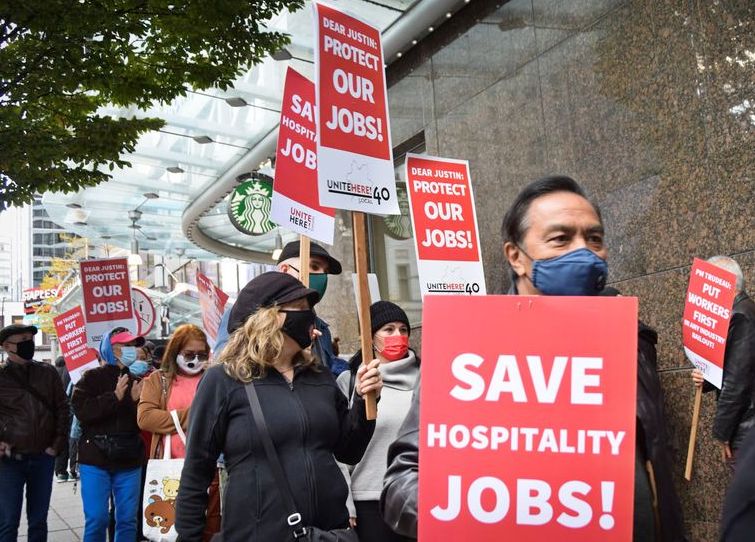 The Toronto
action was held outside the
Marriot Hotel
and the Ottawa action was at the Ottawa Marriott and online. The
targets were hotels owned by
InnVest, Canada's largest hotel owner. InnVest CEO Lydia Chen sits on
the board of the Hotel Association of Canada which is lobbying for
bailout relief alongside airline and airport industry associations. The
federal
government has promised relief for the airline and tourism industries
and it is well-known that industry representatives have been lobbying
and have the ear of government. The workers, without whom neither
industry can function, the actual producers of the added value that
enriches the private owners, have no forum but the streets to raise
their
demands and be heard. BC workers who were peacefully demonstrating on
the lawn of the legislature were prohibited from even entering the
legislature to sit in the visitor's gallery, much less granted a
meeting with any of the MLAs they tried to talk to. The Toronto
action was held outside the
Marriot Hotel
and the Ottawa action was at the Ottawa Marriott and online. The
targets were hotels owned by
InnVest, Canada's largest hotel owner. InnVest CEO Lydia Chen sits on
the board of the Hotel Association of Canada which is lobbying for
bailout relief alongside airline and airport industry associations. The
federal
government has promised relief for the airline and tourism industries
and it is well-known that industry representatives have been lobbying
and have the ear of government. The workers, without whom neither
industry can function, the actual producers of the added value that
enriches the private owners, have no forum but the streets to raise
their
demands and be heard. BC workers who were peacefully demonstrating on
the lawn of the legislature were prohibited from even entering the
legislature to sit in the visitor's gallery, much less granted a
meeting with any of the MLAs they tried to talk to.
The
Vancouver action outside the Hyatt Regency hotel, also an InnVest
hotel, involved about 100 workers and their supporters. A union
activist told Workers' Forum that only about 10
per cent
of workers in
the hospitality sector, most of them employed in hotels and
restaurants, are currently working. Some workers report having been
recalled for short periods and that most employers are not using the
federal government's CEWS program to keep them on the payroll. Many
have been permanently laid off in all three cities. Workers in
Vancouver won improvements in wages and working conditions in a strike
in 2019 and employers are using the pandemic as a cover to violate
those gains, forcing workers to accept lower wages and inferior
conditions in order to be recalled.  In
British Columbia the workers have kept up a steady pressure on the
provincial government to extend the provisions of the labour laws to
address the extraordinary circumstances caused by the pandemic and
extend the time period during which a worker maintains their right to
recall to their former job. Labour Minister Harry Bains
announced on September 1 that the BC government's recovery package
would contain "a pledge for employers to offer a right of first refusal
to existing employees when work resumes," i.e. an option for employers
to "do the right thing." To date the NDP government has refused to take
up its social responsibility to protect these workers' jobs and
the jobs of other BC workers in similar circumstances through
guaranteeing recall rights. In Ontario a number of actions have been
organized to demand that employers guarantee that laid off workers can
return to their jobs as the industry re-starts. In
British Columbia the workers have kept up a steady pressure on the
provincial government to extend the provisions of the labour laws to
address the extraordinary circumstances caused by the pandemic and
extend the time period during which a worker maintains their right to
recall to their former job. Labour Minister Harry Bains
announced on September 1 that the BC government's recovery package
would contain "a pledge for employers to offer a right of first refusal
to existing employees when work resumes," i.e. an option for employers
to "do the right thing." To date the NDP government has refused to take
up its social responsibility to protect these workers' jobs and
the jobs of other BC workers in similar circumstances through
guaranteeing recall rights. In Ontario a number of actions have been
organized to demand that employers guarantee that laid off workers can
return to their jobs as the industry re-starts.
The
issue is this: in whose interests and on whose terms
will the deals be struck between industry and the federal government?
The hospitality workers assert that the government has a social
responsibility to recognize that they have rights. No one is fooled
that they should sit back and hope that employers "do the right thing,"
especially when
employers have been using the pandemic to get rid of large numbers of
workers altogether and blackmail others. The federal government must
ensure that there are no deals without protection of the rights of the
workers to go back to their jobs with the terms and conditions that
existed when they were laid off.
 

Hospitality
workers actions, October 22, 2020, clockwise from top left: Vancouver,
Toronto, Ottawa 
(To
access articles individually click on the black headline.) PDF
PREVIOUS
ISSUES | HOME
Website:
www.cpcml.ca Email: office@cpcml.ca |



 "Nursing-care
and support workers decided today that
there was no other option but to fight to protect Albertans at risk,
especially during the deadliest pandemic in a century. By constantly
short-staffing public health care, this government is pushing our
members to the breaking point exactly when Albertans need them most.
"Nursing-care
and support workers decided today that
there was no other option but to fight to protect Albertans at risk,
especially during the deadliest pandemic in a century. By constantly
short-staffing public health care, this government is pushing our
members to the breaking point exactly when Albertans need them most.
















 Since
they formed government, the UCP has made it implicitly clear that they
are not interested in supporting our vital public health care system.
Jason Kenney has pursued an aggressive agenda of cutting and
privatizing the public services on which Albertans all rely. Even in
the face of a global pandemic, while health care workers have
proven themselves as the first line of defence in the province's
pandemic response, this government merely paused its layoffs of an
estimated 16,000 health care workers province-wide. The plan to
contract out and privatize their jobs is an insult to workers, and a
betrayal of the patients who depend on them.
Since
they formed government, the UCP has made it implicitly clear that they
are not interested in supporting our vital public health care system.
Jason Kenney has pursued an aggressive agenda of cutting and
privatizing the public services on which Albertans all rely. Even in
the face of a global pandemic, while health care workers have
proven themselves as the first line of defence in the province's
pandemic response, this government merely paused its layoffs of an
estimated 16,000 health care workers province-wide. The plan to
contract out and privatize their jobs is an insult to workers, and a
betrayal of the patients who depend on them.

 Meanwhile,
for over a year now, the same government has refused to negotiate with
public sector workers on the basis of their demands. On this it has
been very manipulative. Government claims it wants new collective
agreements to be signed as soon as possible so that full attention can
be paid to the pandemic and hopes that an agreement is possible with
the unions. At the same time, at the bargaining tables, it invokes the
same worn out neo-liberal arguments put forward by governments for over
30 years, that its fiscal framework is tight and is even making demands
for concessions.
Meanwhile,
for over a year now, the same government has refused to negotiate with
public sector workers on the basis of their demands. On this it has
been very manipulative. Government claims it wants new collective
agreements to be signed as soon as possible so that full attention can
be paid to the pandemic and hopes that an agreement is possible with
the unions. At the same time, at the bargaining tables, it invokes the
same worn out neo-liberal arguments put forward by governments for over
30 years, that its fiscal framework is tight and is even making demands
for concessions.

 The
government has, for one year now, maintained its wage offer of five per
cent over three years, plus additional fixed dollar increases for
certain
categories of work. This represents no more than a cost of living
increase and is in fact a wage freeze. All the unions have rejected the
government's wage offer and consider it an insult. Workers are
demanding
wage increases that make up for lost wages after decades of anti-social
austerity and to improve their living conditions, retain staff, and
attract employees.
The
government has, for one year now, maintained its wage offer of five per
cent over three years, plus additional fixed dollar increases for
certain
categories of work. This represents no more than a cost of living
increase and is in fact a wage freeze. All the unions have rejected the
government's wage offer and consider it an insult. Workers are
demanding
wage increases that make up for lost wages after decades of anti-social
austerity and to improve their living conditions, retain staff, and
attract employees.
 UNITE HERE Local 75
picket in Toronto, September
22, 2020
UNITE HERE Local 75
picket in Toronto, September
22, 2020 The Toronto
action was held outside the
Marriot Hotel
and the Ottawa action was at the Ottawa Marriott and online. The
targets were hotels owned by
InnVest, Canada's largest hotel owner. InnVest CEO Lydia Chen sits on
the board of the Hotel Association of Canada which is lobbying for
bailout relief alongside airline and airport industry associations. The
federal
government has promised relief for the airline and tourism industries
and it is well-known that industry representatives have been lobbying
and have the ear of government. The workers, without whom neither
industry can function, the actual producers of the added value that
enriches the private owners, have no forum but the streets to raise
their
demands and be heard. BC workers who were peacefully demonstrating on
the lawn of the legislature were prohibited from even entering the
legislature to sit in the visitor's gallery, much less granted a
meeting with any of the MLAs they tried to talk to.
The Toronto
action was held outside the
Marriot Hotel
and the Ottawa action was at the Ottawa Marriott and online. The
targets were hotels owned by
InnVest, Canada's largest hotel owner. InnVest CEO Lydia Chen sits on
the board of the Hotel Association of Canada which is lobbying for
bailout relief alongside airline and airport industry associations. The
federal
government has promised relief for the airline and tourism industries
and it is well-known that industry representatives have been lobbying
and have the ear of government. The workers, without whom neither
industry can function, the actual producers of the added value that
enriches the private owners, have no forum but the streets to raise
their
demands and be heard. BC workers who were peacefully demonstrating on
the lawn of the legislature were prohibited from even entering the
legislature to sit in the visitor's gallery, much less granted a
meeting with any of the MLAs they tried to talk to. In
British Columbia the workers have kept up a steady pressure on the
provincial government to extend the provisions of the labour laws to
address the extraordinary circumstances caused by the pandemic and
extend the time period during which a worker maintains their right to
recall to their former job. Labour Minister Harry Bains
announced on September 1 that the BC government's recovery package
would contain "a pledge for employers to offer a right of first refusal
to existing employees when work resumes," i.e. an option for employers
to "do the right thing." To date the NDP government has refused to take
up its social responsibility to protect these workers' jobs and
the jobs of other BC workers in similar circumstances through
guaranteeing recall rights. In Ontario a number of actions have been
organized to demand that employers guarantee that laid off workers can
return to their jobs as the industry re-starts.
In
British Columbia the workers have kept up a steady pressure on the
provincial government to extend the provisions of the labour laws to
address the extraordinary circumstances caused by the pandemic and
extend the time period during which a worker maintains their right to
recall to their former job. Labour Minister Harry Bains
announced on September 1 that the BC government's recovery package
would contain "a pledge for employers to offer a right of first refusal
to existing employees when work resumes," i.e. an option for employers
to "do the right thing." To date the NDP government has refused to take
up its social responsibility to protect these workers' jobs and
the jobs of other BC workers in similar circumstances through
guaranteeing recall rights. In Ontario a number of actions have been
organized to demand that employers guarantee that laid off workers can
return to their jobs as the industry re-starts.

